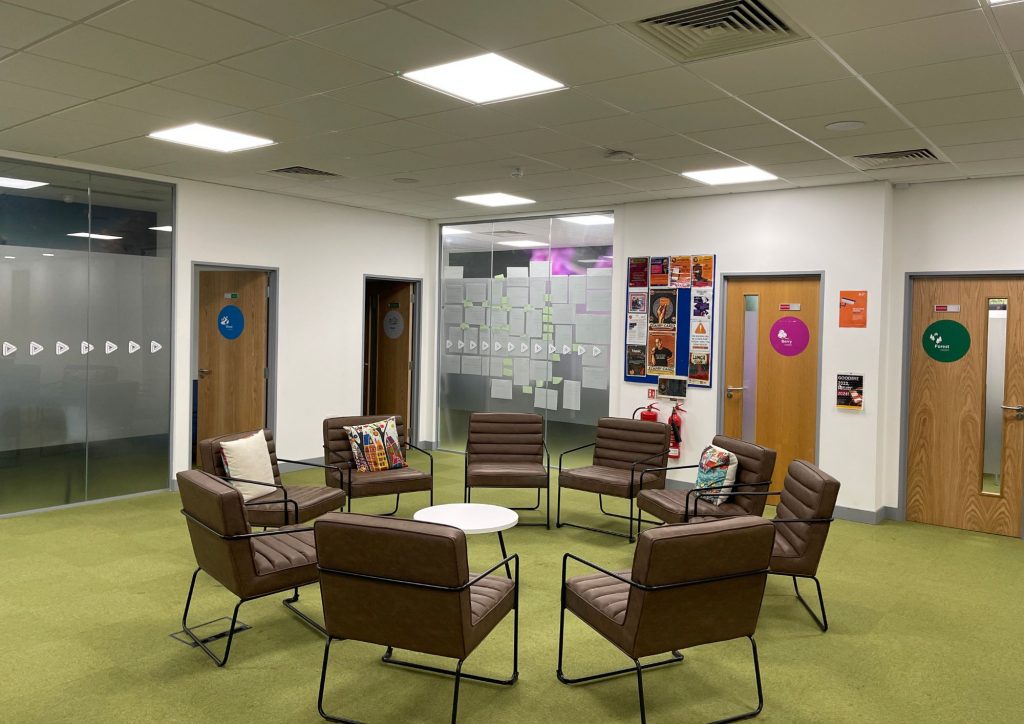Old are ‘dying of loneliness’, warn key workers
Recovery workers say soaring alcohol abuse is linked to isolation
Thursday, 1st February — By Frankie Lister-Fell

The Change Grow Live team and councillors: Lisa Luhman, Jan Daniels, Kate Dallas, Anna Wright, Pat Callaghan, Amy Blake and Patrycja Fila
OLDER people drinking to excess has become “a massive problem in Camden”, alcohol recovery key workers have warned.
Loneliness, an ageing population, and the impact of the pandemic on drinking patterns has caused a spike in the numbers of elderly referrals for alcohol abuse.
“There are more people needing help than there is help available,” said Mary Treacy, a coordinator at the borough’s new drug and alcohol service run by Change Grow Live.
She said: “I think one of the huge aspects of people being in such a state is loneliness. I would put on somebody’s death certificate that they died from loneliness, because all of the drinking escalates the isolation.”
Ms Treacy discovered one of her clients dead in his home, where he had been living alone and in need of help, last month. Camden has one of the highest percentages of people living alone in the city.
In the 2021 census, 39 per cent of Camden households had just one person. CGL was given a contract to run Camden’s Integrated Drug and Alcohol Service (IDAS), formerly run by the NHS, last year. The company said it had adapted the service to provide more for people in isolation, including art clubs and peer mentoring.
Robert Cathrew, deputy service manager, said: “I think it’s a massive problem in Camden, that there is an older group of people that are drinking problematically that will present at A&E quite frequently.
“And they are quite difficult to work with because some of them don’t want to engage. I’ve worked here for 16 years now. We don’t get that many referrals now for people that are maybe drinking 30 units a week and would like a 50 per cent reduction. Most of the referrals we get now are for people that are drinking 60 to 70 units a week and might need some sort of a detox.”
He added: “Most of these people, they live on their own, they don’t have a lot of family or friends. I mean, this guy, Mary actually went up to his property, the door was open, and he was in there, deceased. And he might have been in there for a couple of days. It’s awful, really awful.”
The recovery workers said one of the other challenges affecting Camden is an increase in the number of people sleeping on the streets and powerful synthetic opioids that cause fatal overdoses like nitazenes, which are being laced in opioids like heroin, and also cannabis products and benzos.
Lisa Luhman, commissioner of drug and alcohol service at Camden Council, said: “When you look at alcohol-related hospital admissions and alcohol-related deaths, especially since the pandemic, and the changes that made to people’s drinking patterns, we’re seeing kind of the hard end of that now.”
She added: “We lost a lot of provision during the pandemic where providers were financially unstable before. “And their lack of admissions through the pandemic or the fact that they were at half capacity because of social distancing meant there were a handful of rehab providers that didn’t survive from a financial perspective.”
‘Our open reception is a big deal’
NINE months after the borough’s addiction service swapped providers from the NHS to charities Change Grow Live (CGL) and the Single Homelessness Project (SHP), the New Journal was offered a tour of its new facilities.
The building in King’s Terrace, Camden Town, takes walk-ins and referrals and offers two non-medical prescribers, four doctors and one consultant nurse from the Royal Free. It has replaced the Margarete Centre in Hampstead Road, which closed last April, despite an outcry from consultants and patients who cherished the long-running service.

The new facilities at King’s Terrace, Camden Town
Lisa Luhman, commissioner of drug and alcohol service at Camden Council, said it was “difficult to compare” the new service with the former NHS-run offering, adding: “We had four separate services in Camden before. Each service was offering something slightly different. Now we’ve got an integrated offer, this wonderful building and the development of satellite sites on the way.”
CGL service manager Kate Dallas said: “Trust has taken some time. These things don’t happen overnight. When we first launched in April we had staff from different organisations and also some agency cover. The aim is to provide consistency and that’s happening far more now.”
Ms Dallas added: “Our open reception is a big deal. At the Margarete Centre, and other GP surgeries, they have a glass barrier up and there were security guards as well. We’re trying to create shared ownership of the space.”